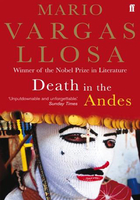In the morning, I procured, at the Prefecture, a full report of all the evidence elicited, and, at the various newspaper offices, a copy of every paper in which, from first to last, had been published any decisive information in regard to this sad affair. Freed from all that was positively disproved, this mass of information stood thus:
Marie Rogêt left the residence of her mother, in the Rue Pavée St. Andrée, about nine o'clock in the morning of Sunday June the twenty-second, 18—. In going out, she gave notice to a Monsieur Jacques St. Eustache, and to him only, of her intent intention to spend the day with an aunt who resided in the Rue des Dr?mes. The Rue des Dr?mes is a short and narrow but populous thoroughfare, not far from the banks of the river, and at a distance of some two miles, in the most direct course possible, from the pension of Madame Rogêt. St. Eustache was the accepted suitor of Marie, and lodged, as well as took his meals, at the pension. He was to have gone for his betrothed at dusk, and to have escorted her home. In the afternoon, however, it came on to rain heavily; and, supposing that she would remain all night at her aunt's, (as she had done under similar circumstances before,) he did not think it necessary to keep his promise. As night drew on, Madame Rogêt (who was an infirm old lady, seventy years of age,) was heard to express a fear "that she should never see Marie again;" but this observation attracted little attention at the time.
On Monday, it was ascertained that the girl had not been to the Rue des Dr?mes; and when the day elapsed without tidings of her, a tardy search was instituted at several points in the city, and its environs. It was not, however until the fourth day from the period of disappearance that any thing satisfactory was ascertained respecting her. On this day, (Wednesday, the twenty-fifth of June,) a Monsieur Beauvais, who, with a friend, had been making inquiries for Marie near the Barrière du Roule, on the shore of the Seine which is opposite the Rue Pavée St. Andrée, was informed that a corpse had just been towed ashore by some fishermen, who had found it floating in the river. Upon seeing the body, Beauvais, after some hesitation, identified it as that of the perfumery-girl. His friend recognized it more promptly.
The face was suffused with dark blood, some of which issued from the mouth. No foam was seen, as in the case of the merely drowned. There was no discoloration in the cellular tissue. About the throat were bruises and impressions of fingers. The arms were bent over on the chest and were rigid. The right hand was clenched; the left partially open. On the left wrist were two circular excoriations, apparently the effect of ropes, or of a rope in more than one volution. A part of the right wrist, also, was much chafed, as well as the back throughout its extent, but more especially at the shoulder-blades. In bringing the body to the shore the fishermen had attached to it a rope; but none of the excoriations had been effected by this. The flesh of the neck was much swollen. There were no cuts apparent, or bruises which appeared the effect of blows. A piece of lace was found tied so tightly around the neck as to be hidden from sight; it was completely buried in the flesh, and was fasted by a knot which lay just under the left ear. This alone would have sufficed to produce death. The medical testimony spoke confidently of the virtuous character of the deceased. She had been subjected, it said, to brutal violence. The corpse was in such condition when found, that there could have been no difficulty in its recognition by friends.
The dress was much torn and otherwise disordered. In the outer garment, a slip, about a foot wide, had been torn upward from the bottom hem to the waist, but not torn off. It was wound three times around the waist, and secured by a sort of hitch in the back. The dress immediately beneath the frock was of fine muslin; and from this a slip eighteen inches wide had been torn entirely out—torn very evenly and with great care. It was found around her neck, fitting loosely, and secured with a hard knot. Over this muslin slip and the slip of lace, the strings of a bonnet were attached; the bonnet being appended. The knot by which the strings of the bonnet were fastened, was not a lady's, but a slip or sailor's knot.
After the recognition of the corpse, it was not, as usual, taken to the Morgue, (this formality being superfluous,) but hastily interred not far front the spot at which it was brought ashore. Through the exertions of Beauvais, the matter was industriously hushed up, as far as possible; and several days had elapsed before any public emotion resulted. A weekly paper, however, at length took up the theme; the corpse was disinterred, and a re-examination instituted; but nothing was elicited beyond what has been already noted. The clothes, however, were now submitted to the mother and friends of the deceased, and fully identified as those worn by the girl upon leaving home.
Meantime, the excitement increased hourly. Several individuals were arrested and discharged. St. Eustache fell especially under suspicion; and he failed, at first, to give an intelligible account of his whereabouts during the Sunday on which Marie left home. Subsequently, however, he submitted to Monsieur G——, affidavits, accounting satisfactorily for every hour of the day in question. As time passed and no discovery ensued, a thousand contradictory rumors were circulated, and journalists busied themselves in suggestions. Among these, the one which attracted the most notice, was the idea that Marie Rogêt still lived—that the corpse found in the Seine was that of some other unfortunate. It will be proper that I submit to the reader some passages which embody the suggestion alluded to. These passages are literal translations from L'Etoile, a paper conducted, in general, with much ability.
"Mademoiselle Rogêt left her mother's house on Sunday morning, June the twenty-second, 18—, with the ostensible purpose of going to see her aunt, or some other connexion, in the Rue des Dr?mes. From that hour, nobody is proved to have seen her. There is no trace or tidings of her at all… . There has no person, whatever, come forward, so far, who saw her at all, on that day, after she left her mother's door… . Now, though we have no evidence that Marie Rogêt was in the land of the living after nine o'clock on Sunday, June the twenty-second, we have proof that, up to that hour, she was alive. On Wednesday noon, at twelve, a female body was discovered afloat on the shore of the Barrière de Roule. This was, even if we presume that Marie Rogêt was thrown into the river within three hours after she left her mother's house, only three days from the time she left her home—three days to an hour. But it is folly to suppose that the murder, if murder was committed on her body, could have been consummated soon enough to have enabled her murderers to throw the body into the river before midnight. Those who are guilty of such horrid crimes, choose darkness rather the; light?… . Thus we see that if the body found in the river was that of Marie Rogêt, it could only have been in the water two and a half days, or three at the outside. All experience has shown that drowned bodies, or bodies thrown into the water immediately after death by violence, require from six to ten days for decomposition to take place to bring them to the top of the water. Even where a cannon is fired over a corpse, and it rises before at least five or six days' immersion, it sinks again, if let alone. Now, we ask, what was there in this cave to cause a departure from the ordinary course of nature??… If the body had been kept in its mangled state on shore until Tuesday night, some trace would be found on shore of the murderers. It is a doubtful point, also, whether the body would be so soon afloat, even were it thrown in after having been dead two days. And, furthermore, it is exceedingly improbable that any villains who had committed such a murder as is here supposed, would have throw the body in without weight to sink it, when such a precaution could have so easily been taken."
The editor here proceeds to argue that the body must have been in the water "not three days merely, but, at least, five times three days," because it was so far decomposed that Beauvais had great difficulty in recognizing it. This latter point, however, was fully disproved. I continue the translation:
"What, then, are the facts on which M. Beauvais says that he has no doubt the body was that of Marie Rogêt? He ripped up the gown sleeve, and says he found marks which satisfied him of the identity. The public generally supposed those marks to have consisted of some description of scars. He rubbed the arm and found hair upon it—something as indefinite, we think, as can readily be imagined—as little conclusive as finding an arm in the sleeve. M. Beauvais did not return that night, but sent word to Madame Rogêt, at seven o'clock, on Wednesday evening, that an investigation was still in progress respecting her daughter. If we allow that Madame Rogêt, from her age and grief, could not go over, (which is allowing a great deal,) there certainly must have been some one who would have thought it worth while to go over and attend the investigation, if they thought the body was that of Marie. Nobody went over. There was nothing said or heard about the matter in the Rue Pavée St. Andrée, that reached even the occupants of the same building. M. St. Eustache, the lover and intended husband of Marie, who boarded in her mother's house, deposes that he did not hear of the discovery of the body of his intended until the next morning, when M. Beauvais came into his chamber and told him of it. For an item of news like this, it strikes us it was very coolly received."















